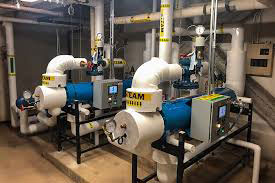Hot Water Treatment
Hot water treatment is the process of treating water that is used for various applications that require hot water, such as heating, cleaning, and sanitation. The goal of hot water treatment is to maintain the quality of the water and prevent corrosion, scaling, and biological growth in the system.

The hot water treatment process typically includes the following steps:
Pretreatment: This step involves removing impurities such as sediment, debris, and dissolved gases from the water before it enters the hot water system. This is usually accomplished through the use of filters, screens, and chemical treatment. Depending on the source of the water, pretreatment may include processes such as coagulation, flocculation, sedimentation, and filtration.
pH adjustment: The pH of the water is adjusted to the appropriate level for the specific hot water system. The pH should be in the range of 7 to 9 for most systems to prevent corrosion. If the pH is too low, chemicals such as sodium hydroxide or potassium hydroxide may be added to increase the pH. If the pH is too high, chemicals such as sulfuric acid or hydrochloric acid may be added to decrease the pH.
Scale control: Scale can form on the surfaces of the hot water system due to the precipitation of dissolved minerals in the water. Scale control is achieved by adding chemicals that inhibit the precipitation of these minerals, such as phosphonates, polymers, and citrates.
Microbial control: Microorganisms can grow in the hot water system, which can lead to fouling, corrosion, and heat transfer problems. Microbial control is achieved by adding biocides, such as chlorine, to the water to kill these microorganisms.
Continuous monitoring: Regular monitoring of the water quality and chemical treatment levels is important to ensure that the hot water system is operating efficiently and effectively. This includes monitoring pH, conductivity, total dissolved solids, and other parameters.
Blowdown: Hot water contains dissolved solids, which will accumulate over time. To maintain the desired level of water quality, a portion of the water is removed through the process of blowdown. This water is replaced with make-up water, which must be pretreated before entering the hot water system.
The advantages of hot water treatment process:
- Prolong the life of the hot water system, prevent corrosion, scaling and bacterial growth
- Improve the efficiency of the system by removing impurities, controlling pH, and preventing scaling
- Maintaining the quality of the water, ensuring that it is safe and suitable for its intended use
- Compliance with regulatory guidelines and standards, avoiding penalties and fines
It is important to note that the specific treatment processes and chemicals used will depend on the type of hot water system, the water source, and the specific operating conditions. A qualified water treatment specialist should be consulted to determine the appropriate treatment program for a specific hot water system.

Neo Nir Engineering
HOUSE OF WATER TREATMENT
Our ability to meet the needs and satisfy our customers is facilitated by our team of water treatment professionals and our more than 20 years of experience. We are able to provide exceptional outcomes because of our high-performance product line and our solution-focused onsite and offsite workforce working together.
Address :
Plot No. A36 City Industrial Estate
Near Swami Narayan Temple
Udhna-Navsari Main Road
Surat, Gujarat, India – 394 210
Phone : 91-261-2312716 / 2364251
Neo Nir Engineering
© Copyright 2023 Neo- Nir Engineering. All Rights Reserved Designed and maintained by Creative Kshetra
